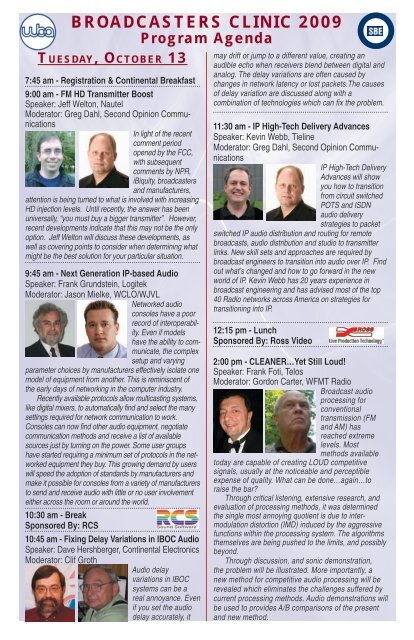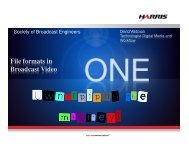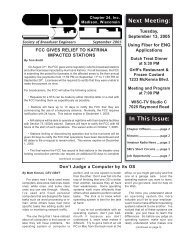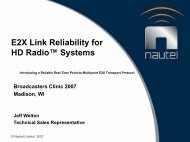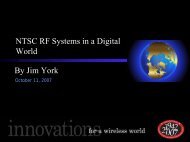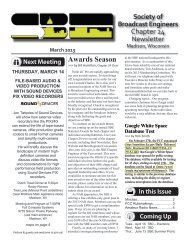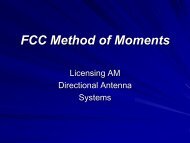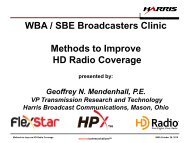Broadcasters Clinic - SBE Chapter 24
Broadcasters Clinic - SBE Chapter 24
Broadcasters Clinic - SBE Chapter 24
Create successful ePaper yourself
Turn your PDF publications into a flip-book with our unique Google optimized e-Paper software.
BROADCASTERS CLINIC 2009<br />
Program Agenda<br />
Tuesday, October 13<br />
7:45 am - Registration & Continental Breakfast<br />
9:00 am - FM HD Transmitter Boost<br />
Speaker: Jeff Welton, Nautel<br />
Moderator: Greg Dahl, Second Opinion Communications<br />
In light of the recent<br />
comment period<br />
opened by the FCC,<br />
with subsequent<br />
comments by NPR,<br />
iBiquity, broadcasters<br />
and manufacturers,<br />
attention is being turned to what is involved with increasing<br />
HD injection levels. Until recently, the answer has been<br />
universally, “you must buy a bigger transmitter”. However,<br />
recent developments indicate that this may not be the only<br />
option. Jeff Welton will discuss these developments, as<br />
well as covering points to consider when determining what<br />
might be the best solution for your particular situation.<br />
9:45 am - Next Generation IP-based Audio<br />
Speaker: Frank Grundstein, Logitek<br />
Moderator: Jason Mielke, WCLO/WJVL<br />
Networked audio<br />
consoles have a poor<br />
record of interoperability.<br />
Even if models<br />
have the ability to communicate,<br />
the complex<br />
setup and varying<br />
parameter choices by manufacturers effectively isolate one<br />
model of equipment from another. This is reminiscent of<br />
the early days of networking in the computer industry.<br />
Recently available protocols allow multicasting systems,<br />
like digital mixers, to automatically find and select the many<br />
settings required for network communication to work.<br />
Consoles can now find other audio equipment, negotiate<br />
communication methods and receive a list of available<br />
sources just by turning on the power. Some user groups<br />
have started requiring a minimum set of protocols in the networked<br />
equipment they buy. This growing demand by users<br />
will speed the adoption of standards by manufacturers and<br />
make it possible for consoles from a variety of manufacturers<br />
to send and receive audio with little or no user involvement<br />
either across the room or around the world.<br />
10:30 am - Break<br />
Sponsored By: RCS<br />
10:45 am - Fixing Delay Variations in IBOC Audio<br />
Speaker: Dave Hershberger, Continental Electronics<br />
Moderator: Clif Groth<br />
Audio delay<br />
variations in IBOC<br />
systems can be a<br />
real annoyance. Even<br />
if you set the audio<br />
delay accurately, it<br />
may drift or jump to a different value, creating an<br />
audible echo when receivers blend between digital and<br />
analog. The delay variations are often caused by<br />
changes in network latency or lost packets.The causes<br />
of delay variation are discussed along with a<br />
combination of technologies which can fix the problem.<br />
11:30 am - IP High-Tech Delivery Advances<br />
Speaker: Kevin Webb, Tieline<br />
Moderator: Greg Dahl, Second Opinion Communications<br />
IP High-Tech Delivery<br />
Advances will show<br />
you how to transition<br />
from circuit switched<br />
POTS and ISDN<br />
audio delivery<br />
strategies to packet<br />
switched IP audio distribution and routing for remote<br />
broadcasts, audio distribution and studio to transmitter<br />
links. New skill sets and approaches are required by<br />
broadcast engineers to transition into audio over IP. Find<br />
out what’s changed and how to go forward in the new<br />
world of IP. Kevin Webb has 20 years experience in<br />
broadcast engineering and has advised most of the top<br />
40 Radio networks across America on strategies for<br />
transitioning into IP.<br />
12:15 pm - Lunch<br />
Sponsored By: Ross Video<br />
2:00 pm - CLEANER…Yet Still Loud!<br />
Speaker: Frank Foti, Telos<br />
Moderator: Gordon Carter, WFMT Radio<br />
Broadcast audio<br />
processing for<br />
conventional<br />
transmission (FM<br />
and AM) has<br />
reached extreme<br />
levels. Most<br />
methods available<br />
today are capable of creating LOUD competitive<br />
signals, usually at the noticeable and perceptible<br />
expense of quality. What can be done…again…to<br />
raise the bar?<br />
Through critical listening, extensive research, and<br />
evaluation of processing methods, it was determined<br />
the single most annoying quotient is due to intermodulation<br />
distortion (IMD) induced by the aggressive<br />
functions within the processing system. The algorithms<br />
themselves are being pushed to the limits, and possibly<br />
beyond.<br />
Through discussion, and sonic demonstration,<br />
the problem will be illustrated. More importantly, a<br />
new method for competitive audio processing will be<br />
revealed which eliminates the challenges suffered by<br />
current processing methods. Audio demonstrations will<br />
be used to provides A/B comparisons of the present<br />
and new method.


